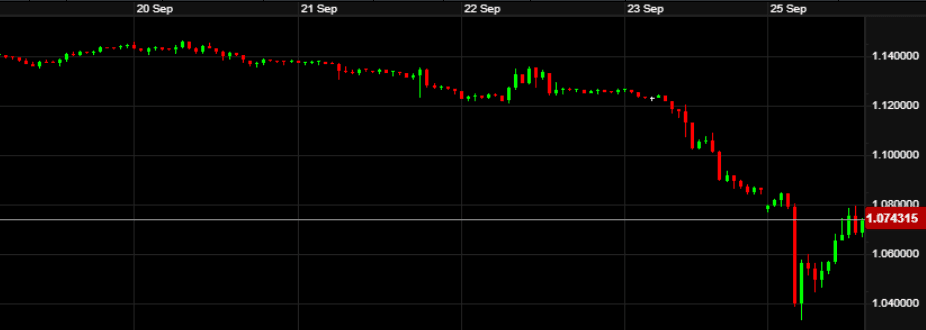ACM Update 26-09-22

Last week saw sizeable market movements for many currencies, with GBP bearing the brunt of it. Sterling fell to its lowest against the Dollar since 1985, as well as the lowest levels in 20 months against the Euro. The new UK Chancellor’s so called “mini-budget” had major ramifications for the Pound. This week hasn’t started any better…
With the bank holiday for the funeral of Queen Elizabeth II taking place last Monday, UK markets were closed for the day. Following on from that though, we saw a frankly incredible week in the FX markets. Having worked in this industry since 2007, other than the Brexit-related events of June 2016, it is tough for me to recall such a volatile week.
In the Eurozone, aside from a fairly routine speech from ECB President Lagarde last week, the main events took place over the weekend in the form of the Italian elections. At the time of writing, Georgia Meloni looks set to become the country’s first far-right leader since World War Two, as part of a coalition government. Aside from this, most of the movement on GBP-EUR came from the sterling side of the equation (read below), which took the pair to its lowest since January 2021.
The recent moves on Sterling-Euro can be seen here:

As expected last week, the Federal Reserve raised US interest rates by a further 75 basis points in their ongoing battle against inflation. Chair Jerome Powell maintained that the Fed will “keep at it” in their battle against inflation, having delivered the third straight 75 basis point hike.
The Dollar has been continuing its path as the world’s safe haven asset in these uncertain times recently. But despite a gloomy outlook from Powell & co in this meeting, the Dollar strength is likely to remain. Expectations are for the US economy to slow to a crawl, not to mention unemployment rising at an alarming rate. These are all further signs of a looming US recession, but with very little else out there to buy as a safe asset at the moment, the Dollar will likely remain incredibly strong.
The next Federal Reserve meeting on the 2nd November is likely to deliver a further 75 basis point hike, with the potential of 50 basis points in the mid-December meeting. The Dollar hit such a high against the Japanese Yen last week that we saw market intervention from Japanese authorities in an attempt to sure up their currency. This is the first time they have done so since 1998.
However, the majority of the market action was focused on GBP last week. On Thursday we saw a further interest rate hike from Andrew Bailey & co at the Bank of England. There were some murmurings that the Bank may have opted for a 75 basis point hike to curb inflation, but despite opinion being split on the nine-member committee, 50 basis points was the choice. This has little impact on GBP, if anything rates fell back a shade.
New UK Chancellor Kwasi Kwarteng unveiled his mini-budget last week, as the new Prime Minister’s “Trussonomics” policies came under fire. In a tax-cutting budget unveiled by Kwarteng on Friday, there were major cuts announced, but primarily aimed at the highest income brackets in the UK. These came alongside the well-publicised assistance on energy costs for UK households and businesses.
The policies were not viewed favourably at all by investors, the currency markets, bond markets, nor many other areas. In fact, former US Treasury Secretary, Larry Summers, told Bloomberg “It makes me very sorry to say, but I think the UK is behaving a bit like an emerging market, turning itself into a submerging market”.
Kwarteng’s cuts are estimated to add £161 billion to UK borrowing over the course of the next five years, at a time where borrowing costs are rapidly increasing globally. Whether the new cuts and policies will help the UK economy remains to be seen, but investors had made their mind up and the impact on the currency was frankly huge. Against the Dollar, GBP lost over 3% on the day, over 5.5% during the week, and now sits over 20% lower than where we started the year. Not to mention the lowest since 1985. Truly eye-watering and unprecedented declines which have continued as we start the new week.
In TV appearances over the weekend, the new Chancellor maintained there was “more to come” in terms of his tax cuts, thus causing further drops for the pound as Asian markets opened for trading on Sunday night. There is now an expectation that the Bank of England will need to go for a full 1% interest rate hike on Thursday 3rd November, or potentially an emergency hike as early as this week. We live in very unpredictable times, with UK interest rates already at their highest in 14 years.
The moves in the last week on GBP-USD can be seen below:

Just to recap all the moves of major central banks last week in their attempts to combat inflation:
Rate rises – Bank of England 50bp, Norges Bank (Norway) 50bp, Federal Reserve 75bp, Swiss National Bank 75bp, South African Reserve Bank 75bp, Riksbank (Sweden) 100bp.
Rate hold – Bank of Japan (but intervened to sure up the currency).
Rate cut – Turkey Central Bank 100bp. President Erdogan (contrary to the rest of the world) believes cutting interest rates will solve the current 80% inflation in the country… The Turkish Lira has halved in value in the last year.
The week ahead:
Monday – ECB President Lagarde speech (14:00 UK time)
Tuesday – Jerome Powell speech (12:30)
Wednesday – Jerome Powell speech (15:15)
Thursday – US GDP for Q2 (13:30), US Unemployment Claims (13:30)
Friday – UK GDP for Q2 (07:00), UK Mortgage Approvals (09:30), Eurozone Inflation estimate & Unemployment Rate (10:00)
As you can see from the above, this week is not as heavy with announcements from major central banks as last week. However, in fairness those were not what did most of the damage last week.
In the UK, most of the focus will be on the fallout from Friday’s mini-budget and whether sterling can find any sense of stability against its peers. Thus far today, the situation has been precarious with GBP-USD bouncing off an all-time low in the small hours of the morning. The movements from here look very uncertain, as we are into uncharted territory. The Dollar looks to remain incredibly strong and combined with the wobbles for the pound recently, we could easily see GBP-USD heading lower. How low is another question entirely.
GBP-EUR has the potential for less of a drastic trend that we have seen versus the Dollar, but much will depend on how these policies are digested ongoing. Please make sure to reach out to the team this week do discuss any upcoming needs.
Have a great week ahead.